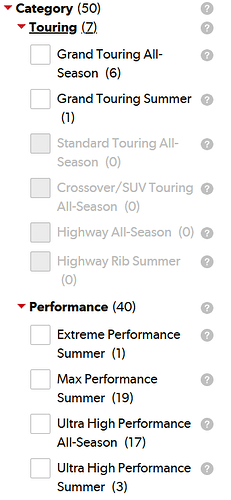A friend recentyl bought a new BMW M2 which came with summer tires that I understand shouldn’t be used under 40 degrees because of rubber cracking so he’s resolved to keep it parked for much of the winter. This seems a little extreme to me so does anyone have real world experience occasionally using summer tires during cold weather?
I’ve been driving for over 30 years now. I have 1 set of tires, on the car, at all times, all seasons.
Granted I live in the southern US, so our temps and weather are generally not that extreme.
Having said that…. I’d just drive the car whenever I wanted, regardless of the season. Next time it needs tires, get some all-season tires.
Just my 2 cents.
Many years ago, a friend bought a Maxima with summer tires. When the first snowstorm came, the tire spin was so bad that he couldn’t even get it out of a parking space for a day or so. As soon as he could drive it, he bought all-season tires.
Summer tires don’t crack when cold, the rubber gets hard resulting in less traction. So he can drive without worrying about damaging the tires.
Me, I’d buy a set of high performance all season tires. I bet he won’t notice any loss of performance.
IIRC you live in Maryland. Except for far western MD, I think that temperatures are mostly close to or above 40F during the day. If it was my Bimmer, I’d continue to use it except in the rain or on ice and snow. Since the alternative is parking it for the winter, your friend must have a different daily driver. My WAG is that he can drive the M2 about half of the winter and won’t have to do any storage prep.
Your friend should buy a second set of wheels and winter tires. Mount those in the fall and continue to drive the car.
That is what the manufacturers want you to do…because they are German and German law says you must use your winter tires in the winter.
I have used modern summer tires - they are not like summer tires were decades ago - with treadwear ratings of about 200, year round. I live where is very rarely drops below 45 degrees so it is not an issue. But the traction loss is noticeable when it drops below 50 degrees. I expect wet traction would be sphincter clenchingly poor.
edit: wow, I expected sphincter to be censored!
The site’s censoring algorithm hasn’t yet been “educated” about the implications of that word.
Summer tires won’t crack. They just aren’t as good in colder weather. And in many cases can be downright dangerous.
As far as the “all season” tire recommendations. Not for me, some “all season” tires are bad in any season.
Seems the person in question has a winter vehicle, so yes leave the BMW parked. Not uncommon, for those that can afford it, to have a winter car to be exposed to the salt and sand while the nice car is garaged.
That can be true. The Bridgestone “all-season” tires (I don’t recall the model)* that came with my 2002 Outback were outright hazardous during the winter, and they weren’t particularly good in rain during the warmer months.
- I just remembered the model. It was the Potenza Re-92. Some internet digging turned-up a lot of reviews stating that this “all season” tire was mediocre–at best–on wet roads, and that it was really poor on winter road surfaces. One review echoed my opinion exactly:
" These tires are flat out terrible in the wet , and near useless in any kind of snow"
I can’t find this anywhere now, but I remember reading a few years ago about a specific performance tire that was definitely damaged if driven in the cold. I’ll disagree with the crowd and say that there is at least a small risk of damage here. Regardless, as others have said, the traction level of the tires could be dangerous at low temperatures.
I think your friend should put on something from the Ultra High Performance All-Season category on Tire Rack’s web site, such as the Continental ExtremeContact DWS 06 Plus or Michelin Pilot Sport All Season 4.
We’ve never had a problem with All-Season tires on any vehicle we’ve owned living here in New Hampshire. I don’t know of anyone having problems either. We just don’t get enough snow or real winter conditions unless you get up north. But in the Boston area - all-season tires are more than acceptable.
I have had summer tires on my Camaro here in NC for 14 years. Different brands. Unless you know of a specific brand that gets damaged I think you are wrong. But they definitely lack traction in the cold.
You don’t say how old tires are. Or tread depth. Tires could be bald. Or mismatched.
Apparently a brand new car, with new tires.
As for “all season”, Tire Rack has 50 different tires that fit, 17 of which are ‘ultra high-performance all-season"‘, tires like Pirelli P Zero, Michelin Pilot Sport. Here’s their comparison test:
Ultra High Performance All-Season: The Search for Balance
Here are the test results:
My Mustang came with all season tires, I don’t remember the brand, scared the h e l l out of me the first time it rained.
Mine were brand new.
Sounds like bad tire problem, not an all season tire problem. Summer tires aren’t necessarily better in the wet.
BMW M2 is $70,000, has 473 horsepower.
Tires: front 275/35R19, rear 285/30R20.
I would wait until spring to drive the car. Why spend money on all season tires for a car that won’t be driven in poor weather?
If they’re in Maryland there’s lots of good driving weather, why garage it for months?

